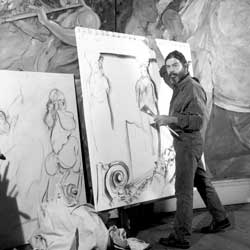George Dureau
by Claire Viguerie, Gambit Weekly
When his car was stolen recently by a 4-foot-8, 24-year-old “boy,” George Dureau already had photographs of both boy and car. Dureau explains that in his art work he uses people he likes, “like the boy who stole the car.”
New Orleans has always been home for internationally renowned artist and photographer Dureau, famous especially for his concentration of works on dwarves, amputees and nude men portraying “dignity and naturalness.” Dureau, now “over 50,” always knew he would be an artist. He remembers giving his first painting — of the fountain in the Little Theatre courtyard —to his mother when he was nine and his subjects were tamer.
Dureau’s Dauphine Street studio/residence is a veritable family album. He shares

Dureau at work in his studio
personal anecdotes while turning pages from stacks of photos and pointing to art covering his walls. A midget in boots is “the last of the dark Gables,” the “concentrated disaster” in another shot was on the Geraldo show. He explains, pointing to one photo, that this man hates his artificial arm. It shows.
Of his affinity for working with the deformed and crippled, Dureau said he has always found them fascinating. “They like it because you make them look good. You’re their artist and can immortalize them and bring out their personalities.”
Portrait photographer David Richmond says that the way Dureau relates to his subjects “is like a child. He has a tight sense of wonder and compassion.” No wonder, then, his models enjoy having a “brilliant guy pay attention to them.”
Dureau’s drawing influenced his photographic style, but he distinguishes the two art forms. “One is creative, the other is editorial,” he says. “Photography is a thing in itself, drawing is part of the mind.”
Turning inward, Dureau recalls days of heavy drinking and a “destructive personality.” But those days have given way to self- preservation. “In the old days I would have drifted into the streets,” he said. “Now I paint, listen to music and go to sleep.” He enjoys his own company, but prefers solitude only in the midst of the kind of buzz he finds in the French Quarter.
Dureau turns momentarily from the family album to yell down from his porch at a boy showing off in Cabrini Playground. He relates details of the boy’s background. The digression might have interrupted another conversation, but with Dureau it was merely the prelude to another brush stroke in an ongoing self- portrait. “I’m actually a cranky, old, moralistic man. A Capricorn who worries about everyone’s affairs.”
